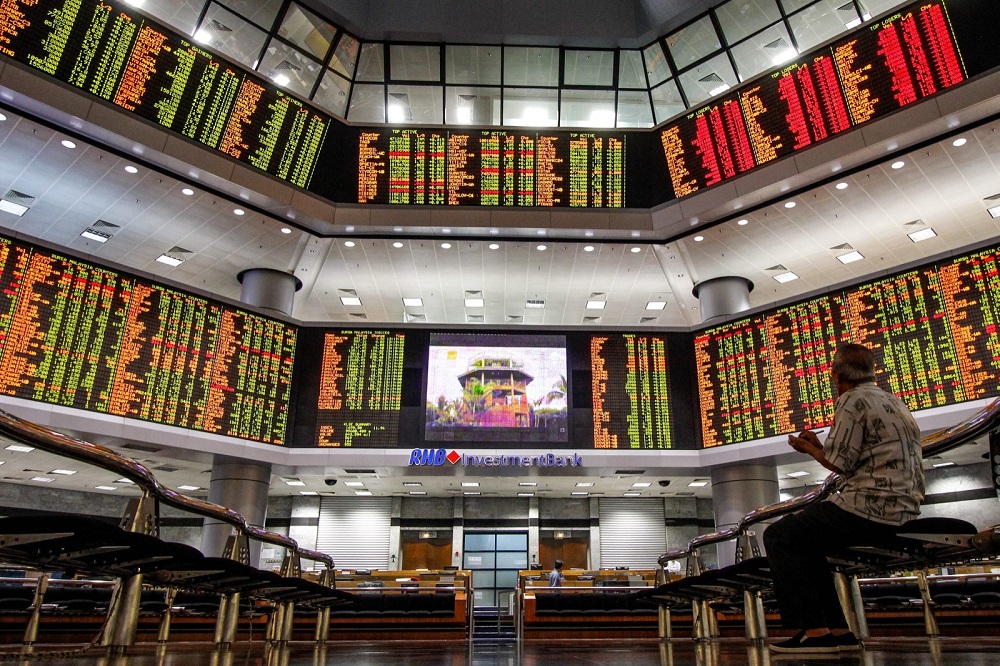KUALA LUMPUR, Aug 10 — Bursa Malaysia ended lower today, bucking the trend of its regional peers after being dragged by persistent profit-taking in the healthcare sector, particularly glove-maker stocks.
At 5.00pm, the benchmark FTSE Bursa Malaysia KLCI (FBM KLCI) ended 6.48 points lower or 0.41 per cent to 1,571.66 from last Friday’s close of 1,578.14.
The key index opened 1.15 points higher at 1,579.29 and moved between 1,558.07 and 1,579.29 throughout the session.
Volume reduced to 19.76 billion shares worth RM7.55 billion from last Friday’s 26.65 billion shares worth RM9.04 billion.
However, market breadth was positive, with gainers leading losers 617 to 538, while 340 counters were unchanged, 475 untraded and 18 others suspended.
Regionally, the Asian shares closed mostly higher, paring earlier losses on positive market sentiment brought by new hopes on the US new stimulus package as President Donald Trump’s recent executive orders pushed the opposition Democrats back to the discussion table.
China’s Shanghai Stock Exchange gained 0.75 per cent to 3,379.25, Hong Kong’s Hang Seng Index slipped 0.63 per cent 24,377.43, and South Korea’s Kospi rose 1.48 per cent to 2,386.38.
Japan and Singapore’s markets were closed today for holidays.
Maybank Investment Bank senior chartist Nik Ihsan Raja Abdullah said today’s trading saw the ACE market continued brimming with retail traders interest, closing relatively higher compared to blue-chips and the second liners.
“The FBM KLCI Index closed at 1,571.66, bouncing off from earlier support at 1,560.
“Technically, the benchmark index is vulnerable towards further pullback in place of the expectations of the weaker earning announcement for second quarter results ahead,” he told Bernama.
Meanwhile, Bank Islam Malaysia Bhd economist Adam Mohamed Rahim said on a sectoral basis, the Bursa Property Index was the best performer today with a gain of more than 1.5 per cent, while the Bursa Technology Index was the biggest laggard with a 2.5 per cent loss.
“Although major decliners consisted of glove players, the Bursa Healthcare Index was buffered by pharmaceutical counters, namely Duopharma Biotech and Pharmaniaga, which were probably driven by a shift from the glove counters to pharmaceutical counters, underpinned by hopes of a COVID-19 vaccine,” he added.
Among the heavyweights, Top Glove declined 94 sen to RM27.20 and Hartalega decreased 78 sen to RM18.36.
Maybank added one sen to RM7.52, Public Bank increased four sen to RM16.80, while Tenaga was flat at RM11.02.
Of the most actives, Borneo Oil added one sen to 8.5 sen, Pegasus edged up half-a-sen to 4.5 sen, XOX and Vivocom were 1.5 sen better at 30.5 sen and 4.5 sen, respectively, and AT Systematization bagged two sen to 12 sen.
On the index board, the FBM Emas Index down 81.81 points to 11,284.56, the FBM Emas Shariah Index dropped 144.47 points to 13,353.08 and the FBMT 100 Index weakened 82.60 points to 11,096.20.
The FBM 70 slipped 252.94 points to 14,557.53, while the FBM ACE surged 298.62 points to 10,615.13.
Sector-wise, the Financial Services Index rose 51.36 points to 12,967.45, the Plantation Index gained 77.70 points to 7,041.45 and the Industrial Products and Services Index improved 0.06 of a point to 141.03.
Main Market volume decreased to 9.88 billion shares worth RM5.16 billion compared with 14.33 billion shares valued at RM5.84 billion last Friday.
Warrants turnover narrowed to 491.36 million units valued at RM208.53 million from 649.49 million units valued at RM248.86 million previously.
Volume on the ACE Market reduced to 9.39 billion shares worth RM2.18 billion versus last Friday’s 11.66 billion shares valued at RM2.95 billion.
Consumer products and services accounted for 1.68 billion shares traded on the Main Market, industrial products and services (3.42 billion), construction (550.25 million), technology (835.86 million), SPAC (nil), financial services (71.63 million), property (1.71 billion), plantations (38.19 million), REITs (8.16 million), closed/fund (23,300), energy (925.27 million), healthcare (171.11 million), telecommunications and media (98.81 million), transportation and logistics (342.57 million), and utilities (28.51 million). — Bernama






















